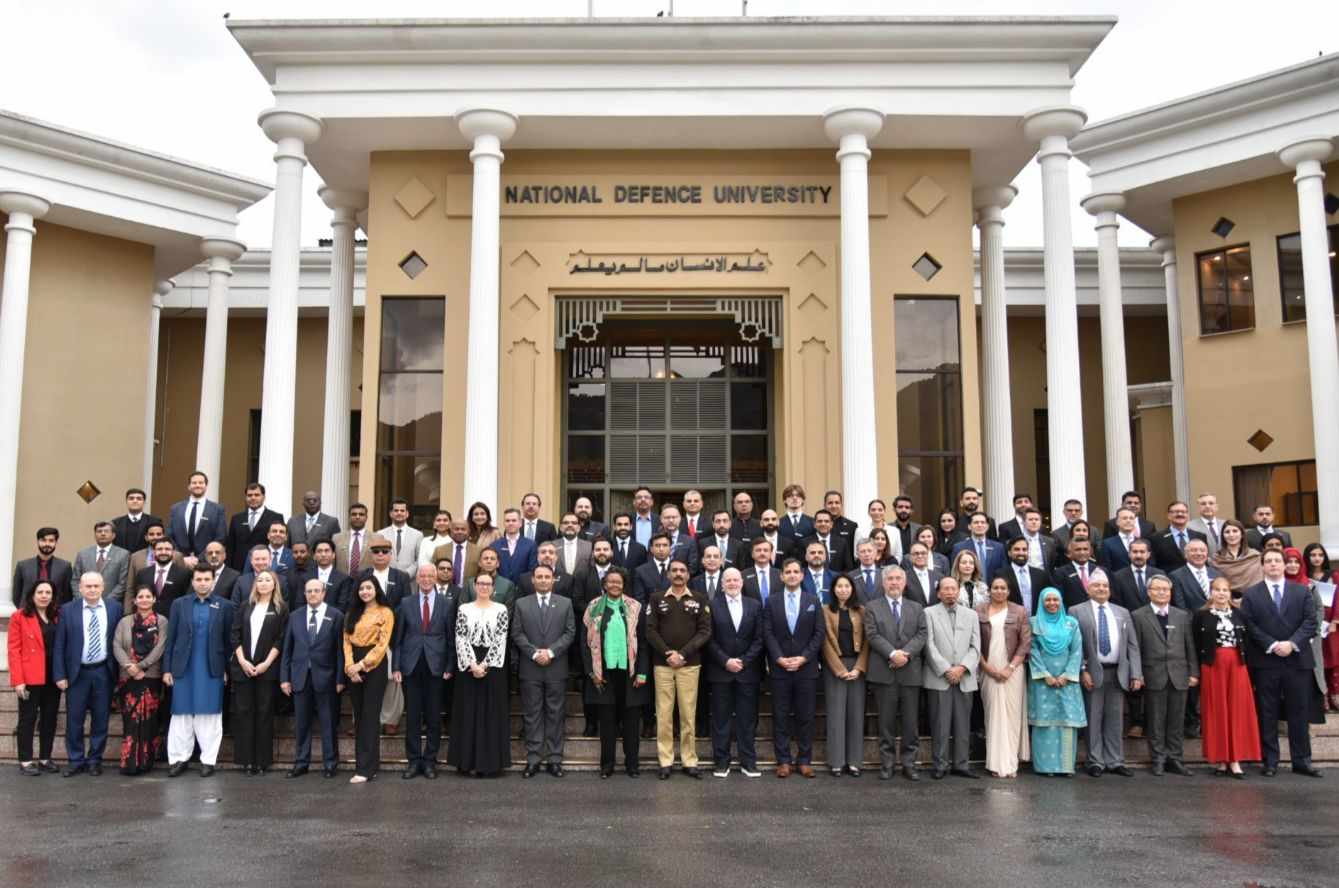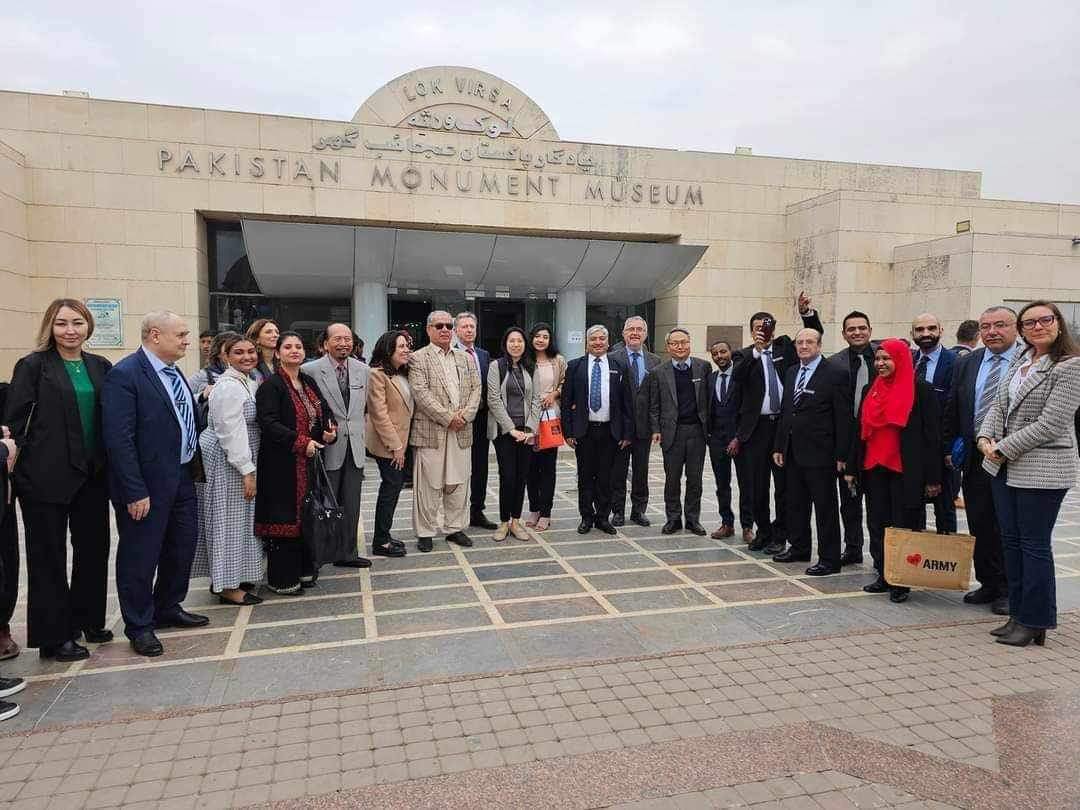KATHMANDU: The Institute for Strategic Studies, Research & Analysis (ISSRA) organized the 4th International Workshop for Leadership & Security (4th IWLS) at the National Defence University (NDU), Islamabad, from February 26 to March 2.
The five-day event, which was organized with the slogan ‘Pakistan Dialogues with the World’ saw participants from around the world engage in debates and discussions on various topics such as Evolving Global & Regional Order, Human Rights, Climate Change, Islamophobia, Culture and Heritage of Pakistan, Regional Cooperation and Stability Opportunities and Challenges, Trade, Investment, and Entrepreneurship in Pakistan, Economy of Pakistan: Opportunities and Challenges, Art & Science of Narrative Shaping in the Post-Truth Era, Looking Into the Future-Tech & Society and Strategic Leadership & Statesmanship among others. Business Leaders, parliamentarians, diplomats, advisors to governments, representatives of leading global think tanks, representatives of international media, promising young professionals, military personnel, and representatives from Pakistani missions across the world, among others, participated in the event.
The event served as a convergence of ideas, insights and perspectives on pertinent issues facing today’s global community. The debates and discussions concluded that South Asia can be prosperous and peaceful, and can usher in the Asian era if there is unity and cooperation in South Asia.
General Narratives about Pakistan
Since it was the first visit to Pakistan for most of the participants, many of them said they were initially concerned about whether Pakistan was safe for travel. The natural beauty, historical sites, and diverse culture make Pakistan a welcoming and intriguing travel destination. Nevertheless, the country was off-limits for many years due to political unrest and safety concerns which still compel people to think twice about visiting Pakistan. However, such a question cannot be addressed with a simple yes or no. Representatives of the Pakistani Army said during the workshop that Pakistan is not the only country in the world with unsecured places; rather, almost all countries have such places globally. They argued that these rumors started to spread especially after the September 11 attacks on the US carried out by the Al-Qaeda in 2001. Therefore, they said that the situation does not remain the same forever.
President of NDU, Lieutenant General Asif Ghafoor, assured the international community that the security system is quite strong, and the mechanism is better in Pakistan. Instead of spreading negativity, it is important to focus on positivity, he added.
Likewise, Asif Durrani, Pakistan’s Special Representative on Afghanistan, said that peace and stability in Afghanistan should be a priority for Pakistan and regional states.

Regional Cooperation
One of the focal points of discussion in the event was the ‘Evolving Global & Regional Order’. Shahid Malik, former Pakistani Higher Commissioner to India, provided his insights into the shifts and dynamics shaping the contemporary international system.
Participants also analyzed the multifaceted aspects of the global order and its implications for regional stability. One of the important aspects that was raised very often during the workshop was the South Asian Association for Regional Cooperation (SAARC). Addressing questions raised by the participants from South Asia regarding the 19th SAARC Summit, which was to be held in Pakistan in 2016, former Pakistani foreign minister Abdullah Hussain Haroon, claimed that the process of the summit has been obstructed because of India. “Kashmir issue is one of the issues that has been impacting the SAARC process,” he said, adding that the Indian prime minister can answer the question better. “Pakistan is ready to host the SAARC Summit if India cooperates and fulfills its commitment.”
While it is being said that SAARC’s future is closely tied to the gravity of conflict and cooperation between India and Pakistan, participants said cooperation between these two nuclear powers could promote economic growth, social progress, and cultural development within the South Asia region. One of the participants said that a peaceful and prosperous SAARC is possible if all member states follow the commitments made in it. SAARC should not be sidelined due to India-Pak relations because SAARC is the only alternative to SAARC, they added.
Diverse Issues
A diverse range of issues like the impact of climate change, ongoing wars in the world, relations between Afghanistan and Pakistan, relation with Pakistan and SAARC member countries, competition between the US, China and Russia, and their influence on other countries, Pakistan’s stance on issues such as the Israel-Palestine conflict were discussed in the workshop. Michael Kugleman, director of the Wilson Center’s South Asia Institute, highlighted the shifting focus of US foreign policy toward Asia and the economic re-dollarization initiatives and efforts to rebuild institutions like the World Bank. Sharing insights from the United States, he shed light on President Biden’s efforts to counter the influence of China and Russia, particularly in the wake of ongoing conflicts such as the war in Ukraine.
Zamir Akram, former ambassador of Pakistan to Geneva and a visiting faculty member at the Department of Strategic Studies, and Maria Sultan, director of South Asia Strategic Stability Institute, discussed the challenges posed by the US support for India in the context of transnational relations. Pakistan is increasingly looking toward China as a strategic partner, leveraging initiatives such as the China-Pakistan Economic Corridor (CPEC) to enhance connectivity and economic development despite some disruptions in its relations with the US, Akram added.
The workshop also drew the attention of participants offering to address pressing global issues like Global Trends: Human Rights, Climate Change, and Islamophobia. In the 21st century of growing awareness of human rights, environmental degradation, and the rise of intolerance, the entire session deliberated on strategies for promoting inclusivity, sustainability, and respect for diversity.

Media and Censorship
The workshop also featured insights from diverse perspectives, including the Art & Science of Narrative shaping in the Post-Truth Era, where Fahad Hussain, president of Pakistan News Network, Asad Baig, founder of the Media Lab, and Ms Liu Xin, Senior Host and Journalist at CGTN highlighted social media, traditional media, and credible media outlets. Hussain shed light on press freedom, media censorship, misinformation, disinformation, and malinformation. He stated that certain mechanisms are required to combat the problem of misinformation, disinformation, and malformation. “With the advancement of new technology, social media has had an intense impact on modern society and it has changed the way we share information and utilize media,” he said. “Therefore, social media should be regulated in Pakistan. Otherwise, this will be a great issue in the future.” Regarding media censorship, he said different forms of media censorship have existed in Pakistan for years.
The workshop highlighted Pakistan’s evolving role in shaping the global order and reaffirming its commitment to promoting cooperation and stability on the world stage.

